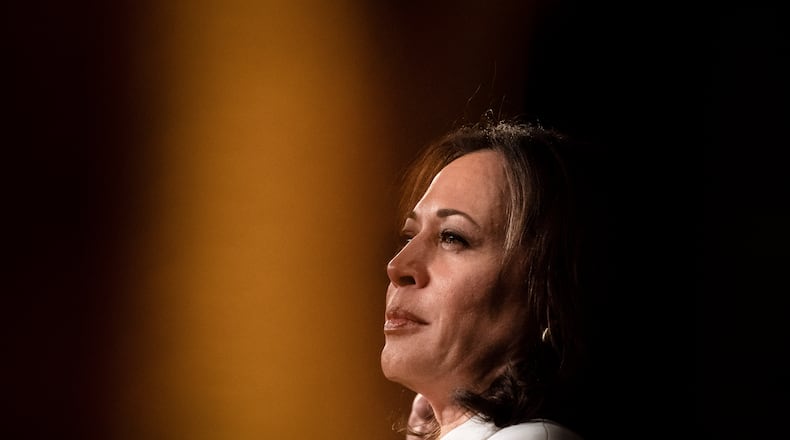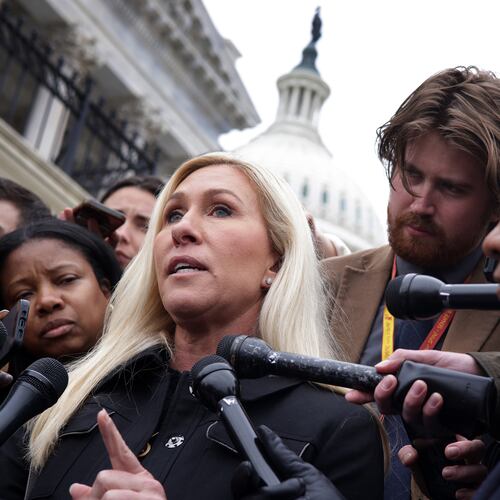Editor’s note: This opinion column was first published Aug. 12, 2020, the day after Harris was selected as Joe Biden’s vice presidential running mate. It was republished July 21, 2024, when Biden announced he would not be accepting the 2024 Democratic nomination and had endorsed Harris as his successor.
When the news hit of Joe Biden’s selection of Kamala Harris as his running mate on Tuesday, the journalist in me made note of it, read some of the national coverage, retweeted the response of Georgia’s Stacey Abrams — who was on the list of potential vice presidential picks — and went about my day.
Harris is making history as the first Black woman and the first Indian American woman on a major party’s presidential ticket.
“Never in my life did I think I’d see someone of Indian descent be a vice presidential candidate!” one Indian friend, a woman who also is a journalist, posted on social media. “It’s amazing to see someone like you break barriers.”
Black friends, many of them women who are in the same sorority as Harris, were just as excited.
“Drops (mic) and strolls away!” one friend posted — along with pink and green hearts, the signature colors of Alpha Kappa Alpha Sorority Inc. — when she shared an article about Biden’s pick.
It wasn’t until hours after the announcement that I allowed myself to reflect on what this means to me as someone with a rare ethnic background who struggled to find role models who looked like me.
My mother is a Black American woman from New York. My father is an immigrant from India.
Harris’ Black father is from Jamaica. Her mother was from India.
Both of us are graduates of historically black colleges and universities. I attended Spelman College here in Atlanta. Harris attended Howard University in Washington.
She culturally identifies the same way I do. According to a 2019 Washington Post article: “Harris grew up embracing her Indian culture, but living a proudly African American life.” The similarities are abundant. She even has a sister named Maya.
All my life I’ve been told how rare it is to meet someone who is both Black and Indian. I, myself, have met few. And I hardly ever, if at all, saw them reflected in a public space.
Growing up, my family jumped at opportunities to see depictions of ourselves. We all piled in the family Chrysler New Yorker to drive 20 minutes away to the only theater in our area showing “Mississippi Masala,” a 1992 film where Sarita Choudhury and Denzel Washington were the romantic leads.
Earlier this year, I was pumped to learn that Issa Rae and Kumail Nanjiani — a South Asian man from Pakistan — were going to be starring in a romantic action/comedy.
I never saw that anywhere — families that looked like mine.
Indian women such as Nikki Haley have led states and served in the United Nations. Black women like Shirley Franklin have led major cities and corporations and newsrooms.
But on Tuesday, for the first time, I saw someone like me was vying to become the country’s next vice president. Politics aside, I’d be lying if I didn’t say it was kind of cool to see myself reflected in that way.
So I stopped what I was doing and sent out a tweet to mark the occasion — which has since gone semi-viral: “As someone who also is Black and Indian American and a woman, it’s rare to see yourself reflected in any way, let alone as a candidate for vice president.”
But now, it’s back to work. I’ll watch as the campaign plays out, recognizing the historic nature of Harris’ run for the vice presidency and what it means for Black and Indian girls in this country.
I understand that many people will push back against the notion of diversity in representation and what it means to see yourself in celebrated positions. They think it divides us — I’ve been told that on social media. I disagree. Representation doesn’t divide, it empowers.
Last night, I chatted with an Indian friend. She said when she was a child her mother told her she could be anything she wanted — and at the time she thought she wanted to be president. Over time she realized every president in her lifetime had been a white man (she was an adult when Barack Obama was elected).
“So I took that off the list as a little girl,” she said. “I hope others don’t have to.”
About the Author
Keep Reading
The Latest
Featured




